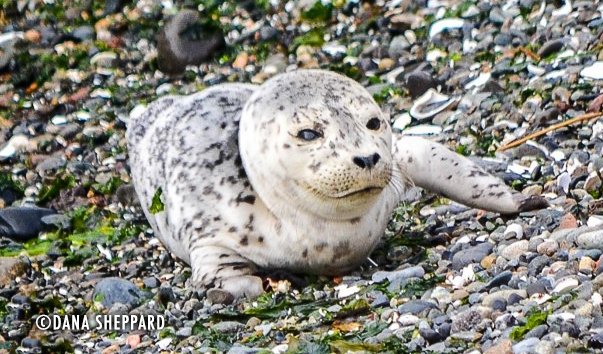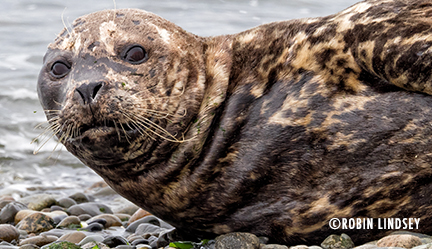Sep 2017
Sad end for seal pup Tawnie
Sep/11/17 06:51 PM

When First Responders Dana and Robin arrived and peered down from the seawall, their worst fears were realized - the terribly thin pup Tawnie with the mysterious hump on his back was wrapped in kelp on the rocky beach. Tawnie (means “little one” in Gypsy) had been observed on a private beach late Friday afternoon (photo above). The pup returned to the Sound around 6pm, forced in by an encroaching tide and had not been seen since. It was thought that the hump was perhaps an abscess or injury to the spine. Volunteers had been on alert for the return of Tawnie in order to do a health assessment and treatment.
As the two responders approached the still, silvery body on the beach Monday, it was clear that the baseball-sized lump was not an abscess, but instead due to an injured or deformed spine. A phone call was place to WDFW marine mammal biologist Dyanna Lambourn to request a necropsy.
A quick on the beach exam by our responders revealed that Tawnie was male and measured only 77cm. The tiny body was placed in a cooler with ice and driven to WDFW’s Lakewood lab that evening.
Dyanna performed the necropsy the following morning and reports that there was indeed a deformity to the spine and possibily the chest cavity. There were no obvious signs of recent trauma. It is like due to a birth defect, but a radiograph will be more definitive and she chose to keep the carcass intact for films.
Tawnie was horribly skinny, weighing a mere 10 kgs with only a .4 blubber thickness. According to Dyanna, the pup probably did fine while nursing, but once he was on his own, limited mobility would have posed challenges for Tawnie to forage effectively. What a very sad ending for such a gorgeous 1-2 month old pup.
We will provide an update once we get results from the radiographs. This has been a tough year so far! It’s about time for some fat, happy blubberballs for us to look after.
Ailing adult seal rests on private beach
Sep/10/17 07:20 PM

David gave Robin a call, who went down to observe as well since it is abnormal to have an adult seal on the beach in West Seatte. Adults are highly wary of people and a healthy seal would flee at the sight of nearby humans. Through binoculars and photos from a telephoto lens, we could see some bloodied wounds on the rear end. Knowing that the transient orcas had been along Alki and in Elliott Bay the day before, we worried the seal might have suffered injuries in an orca encounter. Often, orcas ram seals, sea lions and porpoises, causing serious injuries not always visible to the naked eye. We sought the opinion of SR3, part of the NOAA-approved marine mammal consulting veterinary program.
SR3’s veterinary nurse (and new SSMMSN volunteer) Casey McLean arrived with their transport ambulance (just in case) and observed the seal’s wounds though binocs at a closer distance. The adult, nicknamed Mocha for his rich brown coat, reluctantly returned to Puget Sound shortly afterwards as the incoming tide lapped over him.
Detailed photos of Mocha’s body condition and wounds were sent to SR3’s veterinarian, Dr. Lesanna Lahner, and WDFW’s marine mammal biologist Dyanna Lambourn. Dyanna, who has spent upwards of 30 years studying harbor seals in the wild, felt the flipper wounds were consistent with male seals fighting during mating season.
Harbor seals mate in area rookeries after females give birth and nurse their young. Adult males establish underwater territories to mate and will defend that territory vigorously to keep other males away.
Seal Sitters MMSN will continue to monitor Mocha if he returns ashore to get some much-needed rest. We are thankful he chose private property yesterday with very little foot traffic or off leash dogs.







